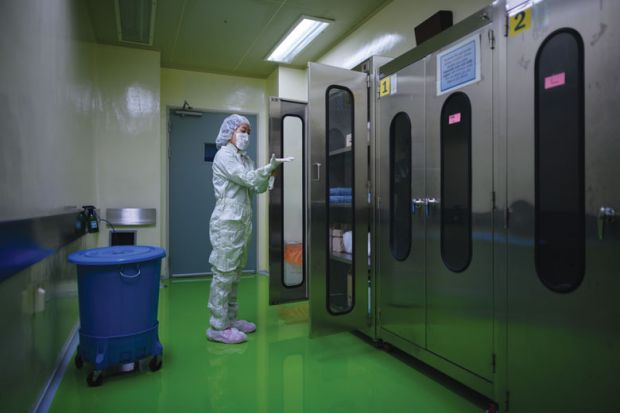Coronavirus researchers have been urged to demand more equitable distribution of the vaccines that they are developing amid warnings that pharmaceutical companies’ secrecy could hold back production when a safe and effective candidate is found.
There are currently 30 potential vaccines undergoing clinical trials, according to the World Health Organisation, and several involve scientists from universities or public research organisations.
The results of trials on patients, and high-level explanations of how the vaccines work, have generally been made public.
But the complex technical details of how to manufacture doses have on the whole not been released, said Mark Rosenberg, the former president of the Task Force for Global Health, a non-governmental organisation focusing on eliminating diseases in developing countries.
“In general, this is considered their [pharmaceutical companies’] IP that they want to hold on to, even if they are prepared to distribute the vaccine,” he said.
Dr Rosenberg, whose career has included two decades at the US’ Centers for Disease Control and Prevention, argued that how vaccines are manufactured should be “open source”. “If the production details are kept secret, we won’t be able to improve it,” he said.
Manuel Martin, innovation and access policy adviser at Médecins Sans Frontières (MSF), said that a lack of transparency over manufacturing processes could slow down current research as well as manufacturing.
“In the context of a pandemic, this is unacceptable,” he said.
Pharmaceutical companies were reluctant to share their secret sauce because they feared giving away details of their “platforms” – the way their vaccines are delivered into the body, Dr Martin explained. He said it was “really crucial” that scientists made transparency a prerequisite of partnering with a commercial manufacturer.
Unlike some relatively simple drugs, vaccines are hard to reverse engineer, meaning manufacturers around the world will struggle to produce their own generic versions, critics say.
Some vaccine groups have committed to releasing at least some manufacturing details. Paul Young, one of the leaders of a vaccine project at the University of Queensland, said that he was “fully on board” with the need to make this public.
Details of the “early stages of manufacturing development” would be released in a preprint imminently, he said. CSL, an Australian biotechnology company that will manufacture the Queensland vaccine if proven effective, will “be taking on communication strategies”, added Professor Young.
More advanced than the Queensland effort is a vaccine candidate being developed by the University of Oxford in partnership with AstraZeneca. But the Oxford-AstraZeneca partnership will not be making public how to manufacture the vaccine. An AstraZeneca spokesman insisted that this would not be a “rate limiting step to [distributing] large volumes of the potential vaccine globally”.
Critics acknowledged that pharmaceutical companies need to make a return on their investment, and cannot simply give away commercial secrets obtained at great expense. And AstraZeneca has said it will supply the vaccine at “no profit during the pandemic”.
But MSF has long argued that there is no transparency from drug companies over how much manufacturing really costs, or how much of a vaccine’s development was ultimately publicly funded, meaning it is impossible to verify if firms truly are not making a profit.
AstraZeneca said that it was building “a number of supply chains in parallel across the world”, and had struck partnerships with manufacturers in countries around the globe.
“Oxford University is fully committed to global equitable access to the vaccine and formed a partnership with AstraZeneca to achieve this goal,” said Andrew Pollard, chief investigator of Oxford’s vaccine trial project.
But AstraZeneca’s third-party collaborations are “very selective”, argued Dr Martin, who said that it would be better if manufacturing instructions were simply made publicly available.
Researchers themselves may not have the leverage over manufacturing companies to ensure equitable distribution, said Dr Rosenberg, who highlighted the key role of governments and international organisations.
POSTSCRIPT:
Print headline: Fighting vaccine secrecy ‘crucial’
Register to continue
Why register?
- Registration is free and only takes a moment
- Once registered, you can read 3 articles a month
- Sign up for our newsletter
Subscribe
Or subscribe for unlimited access to:
- Unlimited access to news, views, insights & reviews
- Digital editions
- Digital access to THE’s university and college rankings analysis
Already registered or a current subscriber? Login










